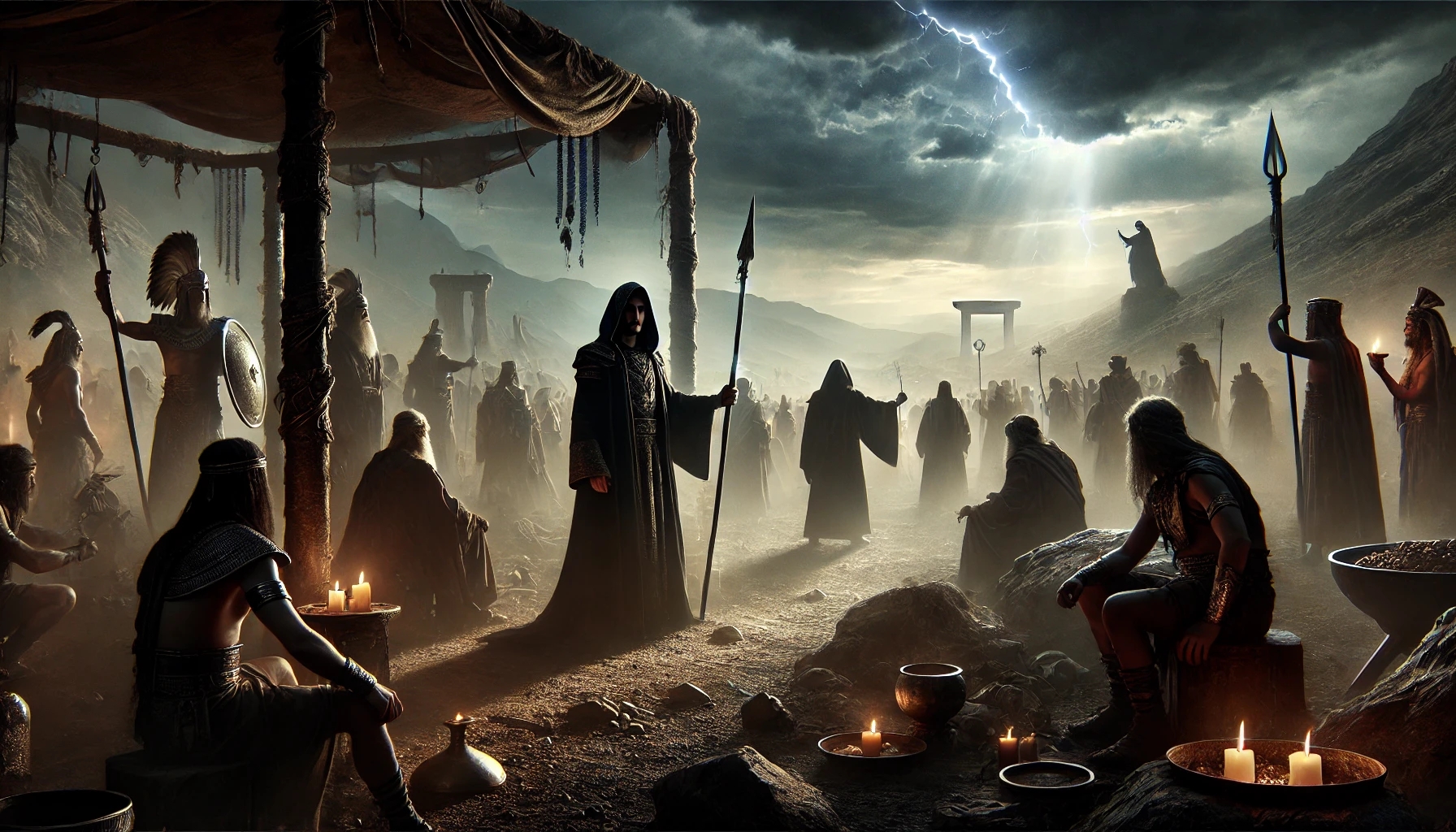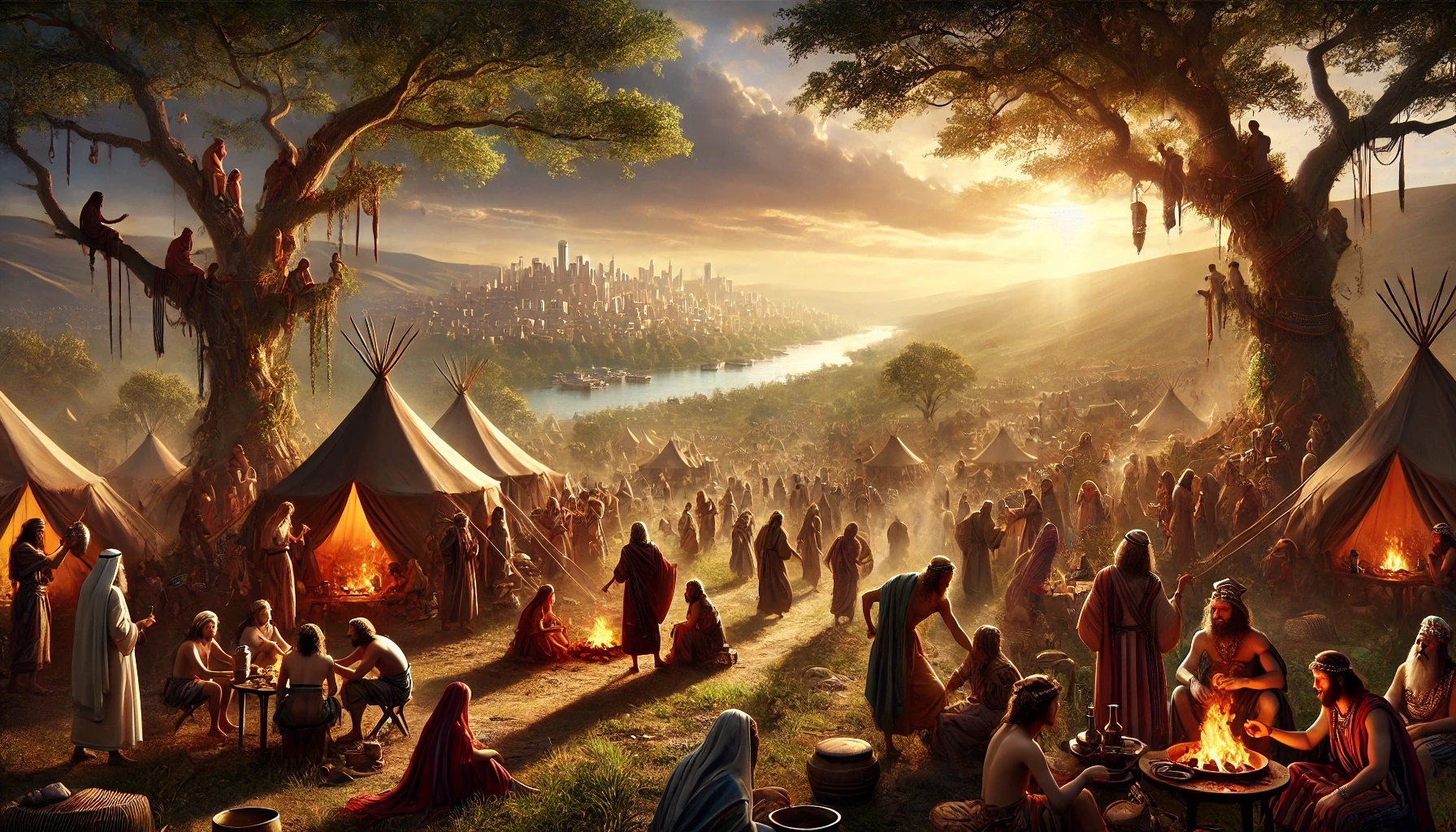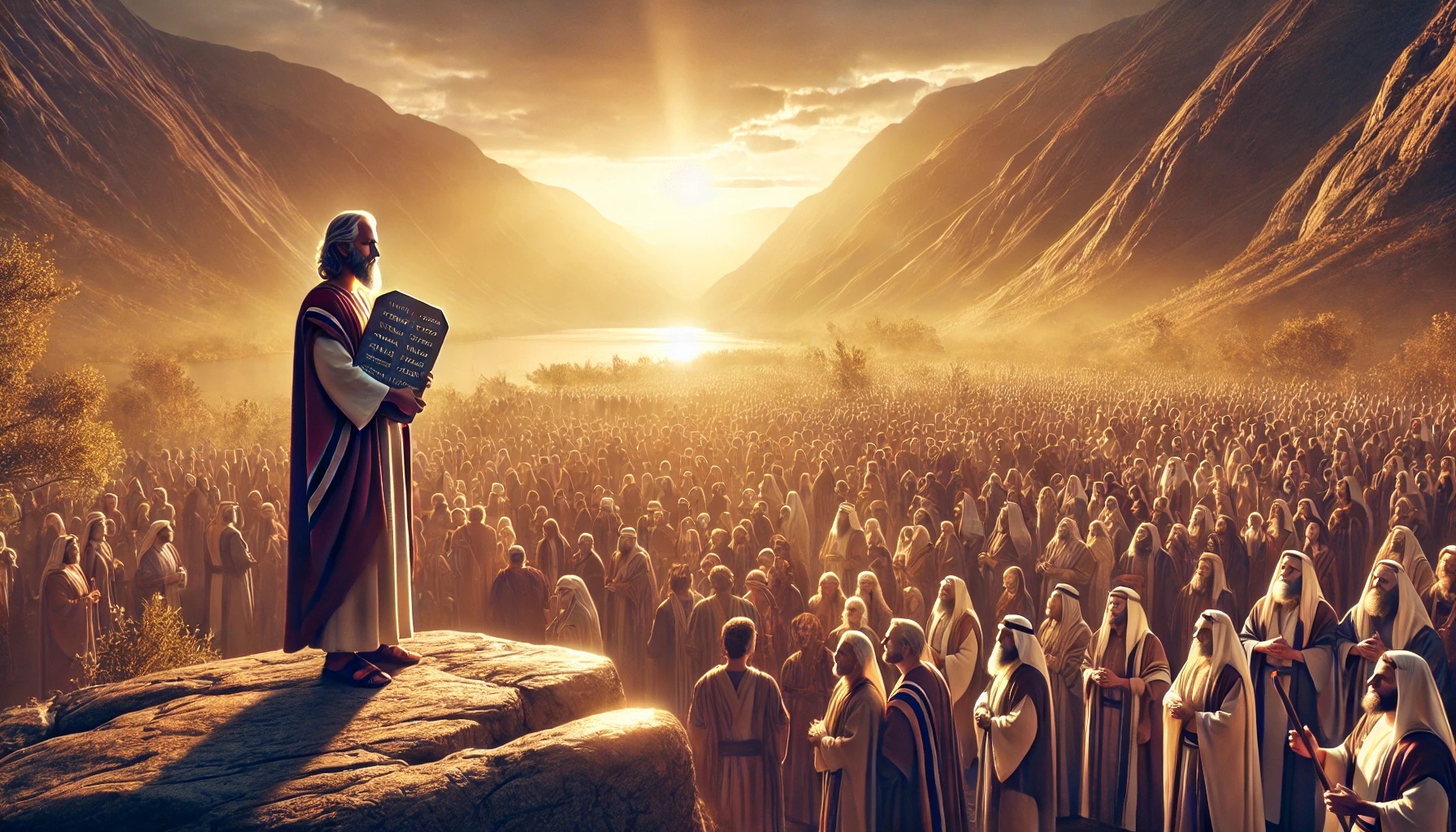
📅 16.November 2025
📚 BELIEVE HIS PROPHETS
📖 Daily Bible Reading
⚖️ Judges 3 – Idolatry, Oppression, and God’s Deliverance
✨ How God tests His unfaithful people – and still saves them
📜 Bible Text – Judges 3 (KJV)
1 Now these are the nations which the Lord left, to prove Israel by them, even as many of Israel as had not known all the wars of Canaan;
2 Only that the generations of the children of Israel might know, to teach them war, at the least such as before knew nothing thereof;
3 Namely, five lords of the Philistines, and all the Canaanites, and the Sidonians, and the Hivites that dwelt in mount Lebanon, from mount Baalhermon unto the entering in of Hamath.
4 And they were to prove Israel by them, to know whether they would hearken unto the commandments of the Lord, which he commanded their fathers by the hand of Moses.
5 And the children of Israel dwelt among the Canaanites, Hittites, and Amorites, and Perizzites, and Hivites, and Jebusites:
6 And they took their daughters to be their wives, and gave their daughters to their sons, and served their gods.
7 And the children of Israel did evil in the sight of the Lord, and forgat the Lord their God, and served Baalim and the groves.
8 Therefore the anger of the Lord was hot against Israel, and he sold them into the hand of Chushanrishathaim king of Mesopotamia: and the children of Israel served Chushanrishathaim eight years.
9 And when the children of Israel cried unto the Lord, the Lord raised up a deliverer to the children of Israel, who delivered them, even Othniel the son of Kenaz, Caleb’s younger brother.
10 And the Spirit of the Lord came upon him, and he judged Israel, and went out to war: and the Lord delivered Chushanrishathaim king of Mesopotamia into his hand; and his hand prevailed against Chushanrishathaim.
11 And the land had rest forty years. And Othniel the son of Kenaz died.
12 And the children of Israel did evil again in the sight of the Lord: and the Lord strengthened Eglon the king of Moab against Israel, because they had done evil in the sight of the Lord.
13 And he gathered unto him the children of Ammon and Amalek, and went and smote Israel, and possessed the city of palm trees.
14 So the children of Israel served Eglon the king of Moab eighteen years.
15 But when the children of Israel cried unto the Lord, the Lord raised them up a deliverer, Ehud the son of Gera, a Benjamite, a man lefthanded: and by him the children of Israel sent a present unto Eglon the king of Moab.
16 But Ehud made him a dagger which had two edges, of a cubit length; and he did gird it under his raiment upon his right thigh.
17 And he brought the present unto Eglon king of Moab: and Eglon was a very fat man.
18 And when he had made an end to offer the present, he sent away the people that bare the present.
19 But he himself turned again from the quarries that were by Gilgal, and said, I have a secret errand unto thee, O king: who said, Keep silence. And all that stood by him went out from him.
20 And Ehud came unto him; and he was sitting in a summer parlour, which he had for himself alone. And Ehud said, I have a message from God unto thee. And he arose out of his seat.
21 And Ehud put forth his left hand, and took the dagger from his right thigh, and thrust it into his belly:
22 And the haft also went in after the blade; and the fat closed upon the blade, so that he could not draw the dagger out of his belly; and the dirt came out.
23 Then Ehud went forth through the porch, and shut the doors of the parlour upon him, and locked them.
24 When he was gone out, his servants came; and when they saw that, behold, the doors of the parlour were locked, they said, Surely he covereth his feet in his summer chamber.
25 And they tarried till they were ashamed: and, behold, he opened not the doors of the parlour; therefore they took a key, and opened them: and, behold, their lord was fallen down dead on the earth.
26 And Ehud escaped while they tarried, and passed beyond the quarries, and escaped unto Seirath.
27 And it came to pass, when he was come, that he blew a trumpet in the mountain of Ephraim, and the children of Israel went down with him from the mount, and he before them.
28 And he said unto them, Follow after me: for the Lord hath delivered your enemies the Moabites into your hand. And they went down after him, and took the fords of Jordan toward Moab, and suffered not a man to pass over.
29 And they slew of Moab at that time about ten thousand men, all lusty, and all men of valour; and there escaped not a man.
30 So Moab was subdued that day under the hand of Israel. And the land had rest fourscore years.
31 And after him was Shamgar the son of Anath, which slew of the Philistines six hundred men with an ox goad: and he also delivered Israel.
══════════════════════════════════════════════
🔵 Introduction
Judges 3 is a key chapter in the entire book. It shows Israel’s recurring cycle:
👉 Apostasy – Oppression – Cry for help – Deliverance – Rest – renewed apostasy.
God allows foreign nations to remain in the land in order to test, train, and sharpen Israel’s faith.
In this chapter the first three judges appear:
-
Othniel – the exemplary, faithful first judge
-
Ehud – the unexpected left-handed deliverer
-
Shamgar – the brief but impressive rescuer
This chapter shows: God uses anyone who makes himself available to Him – even in unusual ways.
══════════════════════════════════════════════
🟡 Commentary
1️⃣ The nations as a test for Israel (vv. 1–6)
God leaves certain nations in the land so that Israel might:
-
learn war (spiritually and practically)
-
be tested in obedience
-
stay awake, not resting in false security
But Israel mingles with the Canaanites:
They marry their sons and daughters, and—worse—adopt their gods.
👉 Compromises become chains.
2️⃣ The first deliverer: Othniel (vv. 7–11)
Israel forgets the Lord and serves Baal and Asherah.
God gives them into the hand of Cushan-Rishathaim for eight harsh years.
But Israel cries to the Lord, and He raises:
Othniel – the first judge
-
the Spirit of the Lord comes upon him
-
he leads the people in battle
-
God grants victory
-
the land has 40 years of rest
👉 Othniel is the model of a faithful, spiritual leader.
3️⃣ The unusual deliverer: Ehud (vv. 12–30)
After Othniel’s death, Israel again falls away.
God strengthens Eglon, king of Moab, who oppresses Israel for 18 years.
Then comes Ehud, the Benjaminite – left-handed, a detail full of meaning:
-
Weapons were normally worn on the left → his on the right → unnoticed
-
God uses his uniqueness as a strategic advantage
Ehud’s approach:
-
He brings a tribute offering.
-
He turns back and requests a private audience.
-
He says: “I have a word from God for you.”
-
He kills Eglon with the concealed double-edged sword.
-
He flees, gathers Israel, occupies the Jordan fords.
-
Israel defeats 10,000 Moabite warriors.
Result: 80 years of rest.
👉 God uses not only the strong – but the unexpected.
4️⃣ The brief report about Shamgar (v. 31)
Shamgar, son of Anath:
-
kills 600 Philistines
-
with an oxgoad – a simple farming tool
-
saves Israel
Short but powerful:
👉 God can do much with little.
══════════════════════════════════════════════
🟢 Summary
Judges 3 shows:
-
Israel repeatedly falls into idolatry.
-
God allows tests to reveal their hearts.
-
Yet every time Israel cries out, God sends a deliverer.
-
Othniel represents faithful obedience.
-
Ehud shows God’s creative, surprising ways.
-
Shamgar proves that God can use simple people with simple tools.
Human unfaithfulness is great – God’s patience is greater.
══════════════════════════════════════════════
📢 Message for Us Today
1️⃣ God uses trials to strengthen our faith – not destroy us.
Obstacles are God’s tools.
2️⃣ Compromises always lead to spiritual bondage.
The small concessions of v. 6 become the idols of v. 7.
3️⃣ God hears every cry for help.
Whenever Israel calls, God intervenes—always.
4️⃣ God uses unusual people and unexpected ways.
A left-handed man (Ehud) and a farmer with a stick (Shamgar) become God’s heroes.
5️⃣ Rest comes when God’s people return to Him.
The 40 and 80 years of peace are the result of obedience.
══════════════════════════════════════════════
💬 Reflection Prompt
👉 What “Moabites” or battles are you facing in your life—and could they be God’s tests meant to strengthen you?
👉 Which call of God challenges you today to take steps of faith?
👉 Are there compromises that have quietly slipped into your heart?
~~~~~ ⚖️ ~~~~~

📆 16–22 November 2025
📚 BELIEVE HIS PROPHETS
📖 Weekly Reading – Spirit of Prophecy
📘 Ellen White | Patriarchs and Prophets – Chapter 41
🔥 Apostasy at the Jordan | Warning against spiritual apostasy and moral seduction
🌐 Read online here
═════════════════════════════════════════════
🔵 Introduction
The people of Israel stood directly at the border of the promised land. After great victories and divine guidance, the long-awaited homeland was within reach. But precisely in this moment of outward success, rest, and comfort came one of the worst spiritual collapses in Israel’s history: the apostasy at Baal-Peor.
This chapter vividly describes how moral seduction, spiritual unfaithfulness, and worldly mingling separated God’s people from their Lord—and what deep spiritual lessons it holds for us today.
═════════════════════════════════════════════
🟡 Commentary
1. The surroundings of Shittim – beauty and danger
Israel camped in a fertile, tropical plain by the Jordan. Outward prosperity, pleasant surroundings, and rest felt relaxing—but also disarming. This phase of leisure became a spiritual trap.
2. The secret seduction by the Midianite women
Midianite women entered the camp unobtrusively. Their intention was not friendship, but targeted seduction into sin. Under the guise of harmony and culture, the Israelites were to be led into idolatry and moral excess.
3. The feast in honor of the idols – Balaam’s strategy
Balaam, who had previously been unable to curse Israel, now found another way: he led the people close to temptation. Music, wine, cheerful feasting, and sensual allure undermined their self-control. Moral fall turned into idolatry.
4. The deadly plague – the consequences of apostasy
The spiritual and moral collapse had catastrophic consequences:
– A plague broke out that took tens of thousands.
– The leaders of the apostasy were judged.
– The camp underwent drastic purification.
5. The zeal of Phinehas
With holy determination, Phinehas acted to stop the judgment.
God affirmed his action and granted him the “covenant of peace”—an everlasting priesthood.
The message: God’s zeal against sin is an expression of His love for His people.
6. God’s judgment on Midian
Because Midian had deliberately led Israel into sin, divine judgment followed.
The lesson: those who cause others to fall spiritually bear tremendous responsibility.
7. The timeless warning—from the Old Testament to the end times
The account is not merely past. Paul explicitly states:
“This happened to them as an example … written for our admonition.” (1 Cor. 10:11)
Just as then:
– Seduction through pleasures
– Blending with worldly values
– moral dullness
– playing with temptation
still lead us away from God.
8. The spiritual mechanism of falling
The decline does not begin suddenly, but:
– thoughts become impure
– vigilance weakens
– prayer is neglected
– association with the world becomes careless
– small compromises accumulate
– in the end, a person visibly falls into sin
9. God’s way of escape: purity of heart
The Bible calls for a sanctified, guarded inner life:
– “Guard your heart” (Prov. 4:23)
– “Gird up the loins of your mind” (1 Pet. 1:13)
– “Whatever is true… think on these things!” (Phil. 4:8)
– “Create in me a clean heart” (Ps. 51:10)
Victory over temptation always begins in the heart—not in outward behavior.
═════════════════════════════════════════════
🟢 Summary
The apostasy at the Jordan shows that the greatest enemy of God’s people is not external threats but inner susceptibility. Israel did not fall by war, but by moral corruption and spiritual negligence. The path into sin began quietly, led to open excess, and ended in heavy judgment. Yet God offers purity, renewal, and protection to those who remain watchful and treasure His Word in their hearts.
═════════════════════════════════════════════
📢 Message for Us Today
Spiritually speaking, we stand just as close to the “heavenly Canaan” as Israel did then. That is why the danger today is great—to fall in this final phase of history through comfort, worldly blending, or moral temptation. Satan uses the same means as then:
– sensual allure
– love of pleasure
– mingling with godless values
– neglect of prayer
– compromises in thinking
Therefore God’s call is:
Watchfulness, purity of heart, separation from destructive influences, and deep connection with His Word.
═════════════════════════════════════════════
💬 Reflection Questions
What “Shittim moments” are there in my life—times of rest or self-satisfaction when I am particularly vulnerable to temptation? And how can I guard my heart before small compromises grow into great sins?
~~~~~ ⚖️ ~~~~~

📆 16–22 November 2025
📚 BELIEVE HIS PROPHETS
📖 Weekly Reading – Spirit of Prophecy
📘 Ellen White | Patriarchs and Prophets – Chapter 42
🔥 The Law Repeated | Moses’ final exhortations and God’s enduring call to obedience
🌐 Read online here
═════════════════════════════════════════════
🔵 Introduction
Shortly before entering the promised land, Moses gathers the people of Israel one last time. He knows that his time as leader is ending—and that he himself will not enter Canaan. But before he departs, he repeats God’s law and reminds them of the great responsibility connected with the covenant with God. In a passionate, far-reaching appeal, he calls the people to faithfulness, obedience, and a choice for life.
═════════════════════════════════════════════
🟡 Commentary
1. Moses’ farewell in humility and concern
Moses asks God to allow him to go into the land—God does not permit it. Yet Moses accepts God’s decision and is not concerned about himself but about the people. He asks for a successor—and God chooses Joshua.
2. Joshua’s calling – a spiritual leader appointed
God chooses Joshua, “a man in whom is the Spirit” (Num. 27:18). Moses lays hands on him before the whole nation, investing him with authority. This shows: leadership is not human ambition but a divine commission.
3. Why the law needed to be repeated
The new generation was young at Sinai. They needed to hear God’s law again—to understand why obedience is the foundation for blessing, safety, and fellowship with God. The repetition was meant to touch heart and conscience anew.
4. Looking back at God’s guidance and grace
Moses reminds Israel of:
-
the deliverance from Egypt
-
the miracles in the wilderness
-
the giving of the law
-
God’s nearness
He shows: No other nation was ever so loved, guided, and blessed by God.
5. Israel—chosen out of love, not merit
“Not because you were more in number… but because He loved you” (Deut. 7:7–9). God’s covenant is based on faithfulness and grace—not on Israel’s strength. This truth is central to prevent pride and self-righteousness.
6. The promised land – both gift and responsibility
Moses describes the land: fertile, beautiful, supplied by God. But the warning follows immediately: When you are full, do not forget the Lord (Deut. 6:10–12). Prosperity can become a danger if it creates spiritual drowsiness.
7. Blessing and curse – the choice of life
Chapter 28 contains two mighty lists:
-
Blessing for obedience: abundance, protection, success
-
Curse for disobedience: hardship, scattering, judgment
These warnings were tragically fulfilled in Israel’s history—among them the destruction of Jerusalem by Rome.
8. The solemn appeal: Choose life!
“I have set before you life and death, blessing and curse… therefore choose life” (Deut. 30:19).
God does not force—He calls. Obedience is not external duty but a decision born of love for God.
9. The Song of Moses – remembrance in poetic form
To imprint everything, Moses composes a song. It recounts God’s dealings and warns toward faithfulness. The people are to memorize it and pass it on to future generations—God’s truth is meant to penetrate the heart.
═════════════════════════════════════════════
🟢 Summary
Chapter 42 is Moses’ final great appearance before his death. He repeats the law, calls the people to decision, and transfers leadership to Joshua. The heart of his message: Israel was chosen by grace—now they are to respond with obedience and love. Blessing and curse lie openly before them. The choice is theirs.
═════════════════════════════════════════════
📢 Message for Us Today
We too stand spiritually at the border of the “promised land”—the second coming of Jesus. God’s law still stands as the standard for our lives. The choice between life and death, obedience or our own path, arises anew each day. Prosperity, routine, and spiritual indifference are the same dangers now as then. God’s call applies to us as well:
– Choose life.
– Hold fast to the Word.
– Teach it to your children.
– Live with God—and for God.
═════════════════════════════════════════════
💬 Reflection Questions
➡️ What shapes my daily decisions—comfort or obedience?
➡️ Is God’s law alive in my heart—or merely a duty?
➡️ How can others tell that I have chosen life with God?
➡️ How can I pass on the spiritual heritage to the next generation?
══════════════════════════════════════════════
LuxVerbi | The light of the Word. The clarity of faith.




















